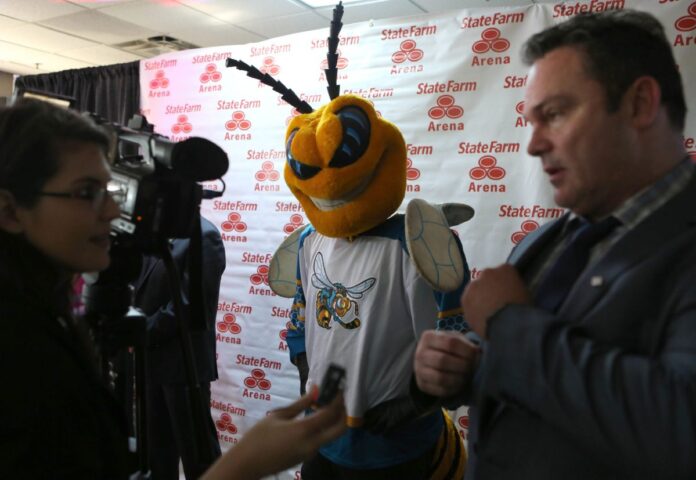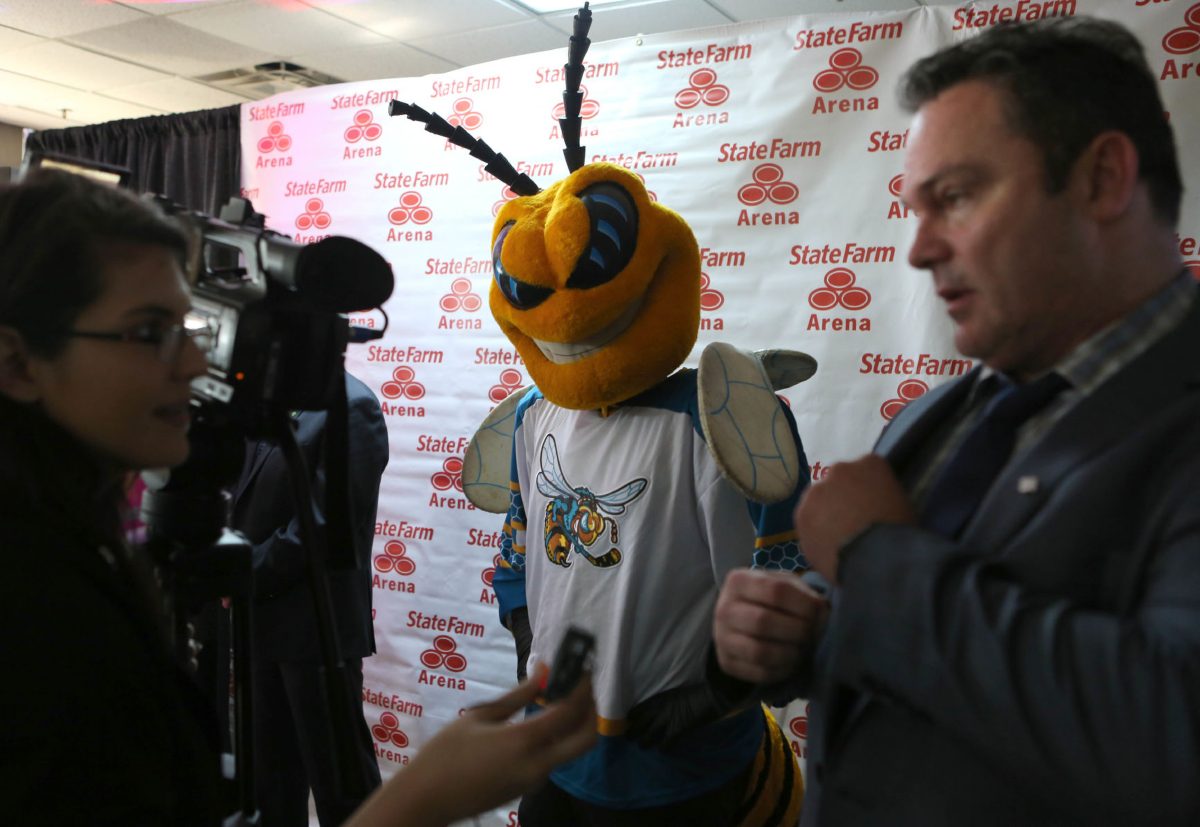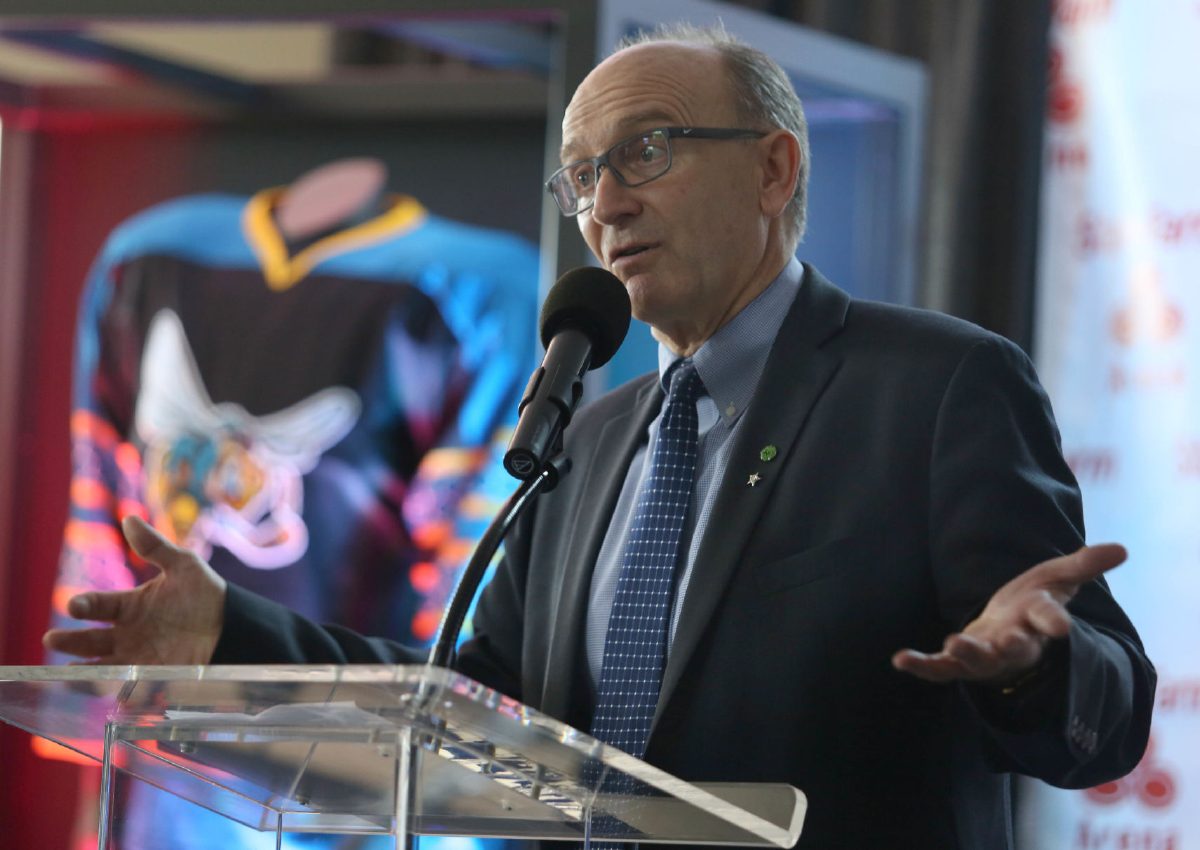
HIDALGO — Nostalgia was in the air, but so was fresh excitement with Wednesday’s announcement that the RGV Killer Bees would be returning to State Farm Arena in Hidalgo for the 2018-19 season.
The third iteration of the Killer Bees will play in the USA Central Hockey League, a newly formed junior league that will also operate in Hidalgo.
Wednesday’s news conference at the arena opened with the familiar intro video that has welcomed the Bees onto the ice since their inaugural home game on Oct. 31, 2003. After a cameo from mascot Sir Sting-A-Lot, the group spearheading the return looked to the future.
Former semiprofessional hockey player Bill Davidson will own the team. Davidson, a native of Vancouver, Canada, who most recently lived in the Corpus Christi area, is hoping to provide entertainment for the remaining hockey fan base while making new community inroads.
“The fan following is amazing,” Davidson said. “Everywhere we’re going in the community, they’re so excited. We haven’t heard one bad thing. It’s always like, ‘Yeah, they’re back. You guys are back!’”
Rick Kozuback, who was instrumental in attracting the sport to the area for the first time in 2003, will serve as the league’s commissioner.
Kozuback, another Canada native, said the hard work to attract the franchise and build the arena in the early 2000s made Wednesday even sweeter. He’s hoping to recreate the excitement that surrounded the first iteration of the franchise, which played in the Central Hockey League at the minor league professional level from 2003-12.
“To be able to come back now and bring hockey back here, I know that the building is anxious to have a major tenant with basketball moving out,” Kozuback said. “To have hockey back in a market that, for us, was successful. We had a lot of good fan support. The early years were very successful. A lot of people, a lot sponsors, a lot of buzz in the community.”
The State Farm Arena will part ways with longtime tenant the RGV Vipers after this season as the hoops team moves to the yet-to-open Bert Ogden Arena in Edinburg.
“We’re sad to see the Vipers leave to their new facility,” State Farm Arena general manager Marc Solis said. “We’ve been working on trying to get ice hockey back here to Hidalgo for some time. We had a few different leagues that we were taking a look at, some leagues that were looking at us. This one just made perfect sense because of the people behind it. They know hockey, they have a solid foundation, and they know how to start leagues.”
The league will be a U-20 junior organization — similar to the latest version of the Bees that competed in the North American Hockey League for two seasons before ceasing operations in 2015 — but hopes to mirror the rules and speedy style of the National Hockey League.
Davidson said he’ll be leaning on his western Canadian connections to fill out his roster and front office staff.
“ I’m tied into the BCHL (British Columbia Hockey League) up in Canada, and we’re bringing on guys that have lots of experience in the hockey world markets — Europeans,” Davidson said. “We’re really tied in. We have a really good network for that.”
The USA CHL will have a hand in the management of the team, which Kozuback and Davidson hope will help strengthen both entities.
“The league has heavy involvement in managing the team this time around,” Davidson said. “We’re not really leaving it up to an individual owner. It’s almost like a corporate store, especially for our first four pillars.”
The league will launch in the 2018-19 season with six teams. Play is expected to run from late October through March. Each team will play a 60-game schedule, and State Farm Arena will host 30 regular season home games.
The renewed rivalry with the Laredo Bucks also looms on the horizon, as an announcement similar to Wednesday’s is expected in Laredo down the line.
“We know that we’re going to have a bulk of the franchises in this part of the country,” Kozuback said. “Anything you can do to keep cost down gives the team a chance to sustain itself. If you can keep the budget manageable and ticket prices relatively low so people can actually come to the games, then I think you have a chance to be successful.”





